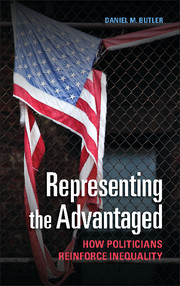Book contents
- Frontmatter
- Contents
- Acknowledgments
- 1 Representatives as the Source of Bias
- 2 When Can Representation Break Down?
- 3 Details of the Constituency Service Field Experiments
- 4 Bias in the Way Officials Process Constituents’ Opinions
- 5 Information Costs and Officials’ Proactive Effort Levels
- 6 Direct Discrimination
- 7 Bias in Politics
- References
- Index
5 - Information Costs and Officials’ Proactive Effort Levels
Published online by Cambridge University Press: 05 August 2014
- Frontmatter
- Contents
- Acknowledgments
- 1 Representatives as the Source of Bias
- 2 When Can Representation Break Down?
- 3 Details of the Constituency Service Field Experiments
- 4 Bias in the Way Officials Process Constituents’ Opinions
- 5 Information Costs and Officials’ Proactive Effort Levels
- 6 Direct Discrimination
- 7 Bias in Politics
- References
- Index
Summary
Imagine yourself as a mayor. In office you have gained a lot of knowledge about how your community works. But you also have the personal knowledge you brought to office from living in your community and seeing how things work. This personal knowledge helps you perform your duties more efficiently because you have a good understanding of how your city programs run. Consider the local school system. As a longtime community resident, you have likely raised your children in the community and know about some of the programs the local schools offer.
Suppose you receive an e-mail from a Mr. Dan Johnson, who is relocating to your area for work. The Johnson family is comparing different communities to decide where to live, and the father is asking about access to a public library and the programs at the high school. Mr. Johnson could look up this information himself on the school’s website, but making people happy is good politics. Can you easily answer his question? Will you take the time to research and answer it? Does your decision to answer depend on which school program Mr. Johnson asks about? Are you more likely to answer if he asks about advanced placement programs rather than free lunch programs?
The Importance of Information
Public officials have limited time and energy and so must carefully choose which issues they will work on. They cannot answer every request for help or tackle every possible issue, even those that seem important to their constituents. They must selectively choose where to focus their energy.
Public officials might decide which issues to focus on based on the information they bring to office. The more information they have, the less time and energy it will take to work on that topic. And the less time it takes to work on an issue, the more likely it is that they will give the issue attention (Hall and Deardorff 2006). By focusing on areas for which they have an informational advantage, politicians are able to maximize their reelection chances with the fewest resources possible.
- Type
- Chapter
- Information
- Representing the AdvantagedHow Politicians Reinforce Inequality, pp. 62 - 83Publisher: Cambridge University PressPrint publication year: 2014



